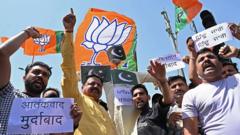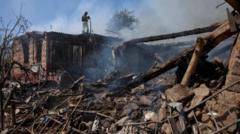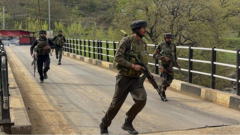The recent terrorist attack in Pahalgam, Kashmir, resulting in the deaths of 26 tourists, marks a significant turning point in Indo-Pak relations. With a history of military escalations after such events, India's potential response, whether through airstrikes or cross-border actions, carries high stakes and risks of further conflict.
Rising Tensions: India’s Response to Kashmir Tourist Attack

Rising Tensions: India’s Response to Kashmir Tourist Attack
Following a deadly attack on tourists in Kashmir, India faces mounting pressure for a decisive military response against Pakistan, balancing retaliation with the risk of escalation.
The Pahalgam tragedy on Tuesday, where gunfire led to the deaths of at least 26 tourists, has triggered alarm bells in India, marking a grim moment in Kashmir's ongoing turmoil. This incident stands out as one of the deadliest attacks on civilians since 2019, attacking not just defenseless lives but also a narrative of normalcy that India's government has strived to uphold in the picturesque yet contentious region.
Given the historical backdrop of Kashmir, which both India and Pakistan claim yet govern partially, experts suggest India's forthcoming actions will be influenced by past events as well as mounting political pressure. Quickly shifting gears, Delhi has implemented several punitive measures: closing the main border crossing, halting a significant water-sharing agreement, and expelling certain diplomatic staff. More importantly, Defence Minister Rajnath Singh has vowed a "strong response," targeting not only the attackers but also their instigators.
Analysts contend that a military retaliation seems inevitable; the pressing inquiries, however, pertain to the timing and the scale of such actions, as well as the potential repercussions. Military historian Srinath Raghavan explains, "Since 2016 and significantly post-2019, the norm for retaliation has been a shift to air strikes or cross-border operations." He highlights that the politically charged environment makes it difficult for the current government to respond with less than that expected standard.
India has a storied history of retaliating against militant attacks in Kashmir; notable incidents include the 2016 surgical strikes following the Uri attack that killed 19 soldiers and the 2019 Balakot airstrikes post-Pulwama, which claimed 40 paramilitary lives. Both actions showcased military might without escalating into a full-scale war, though they did lead to aerial confrontations. After several tense exchanges, a fragile ceasefire was established in 2021.
Foreign policy analyst Michael Kugelman underscores the implications of high civilian casualties in the recent assault, signaling potential repercussions for Pakistan if India believes there was any level of complicity from across the border. "Public pressure will build for a forceful answer from India," he asserts, stressing political motivations behind military actions.
Among possible responses, covert operations offer a level of discretion but might fall short of demonstrating political resolve, suggesting broader military engagement could be on the horizon. The tenuous ceasefire established in 2021 could again become shaky, as Prime Minister Modi may opt for targeted cross-border operations or even airstrikes akin to the 2019 response.
Independent experts note the inherent risks in any military engagement, particularly when both nations are nuclear-armed, complicating even restrained responses. Raghavan warns of potential miscalculations that could arise in an already volatile environment, while Kugelman reflects on the lessons from prior engagements, suggesting that any course of action carries the peril of conflict escalation.
Hussain Haqqani, a former ambassador, adds that India might lean towards limited surgical strikes, which provide a political façade of action without leading to outright war. Yet, he cautions against the unpredictability of Pakistan’s reactions, particularly if these actions are perceived as unsubstantiated blame.
The stakes of India’s impending decision loom large over the region, where the delicate peace in Kashmir is endangered at every turn. Moreover, this incident raises critical questions on security measures that failed to prevent such an attack at a time when tourism was flourishing—pointing to substantial lapses in governance that must be addressed moving forward.




















